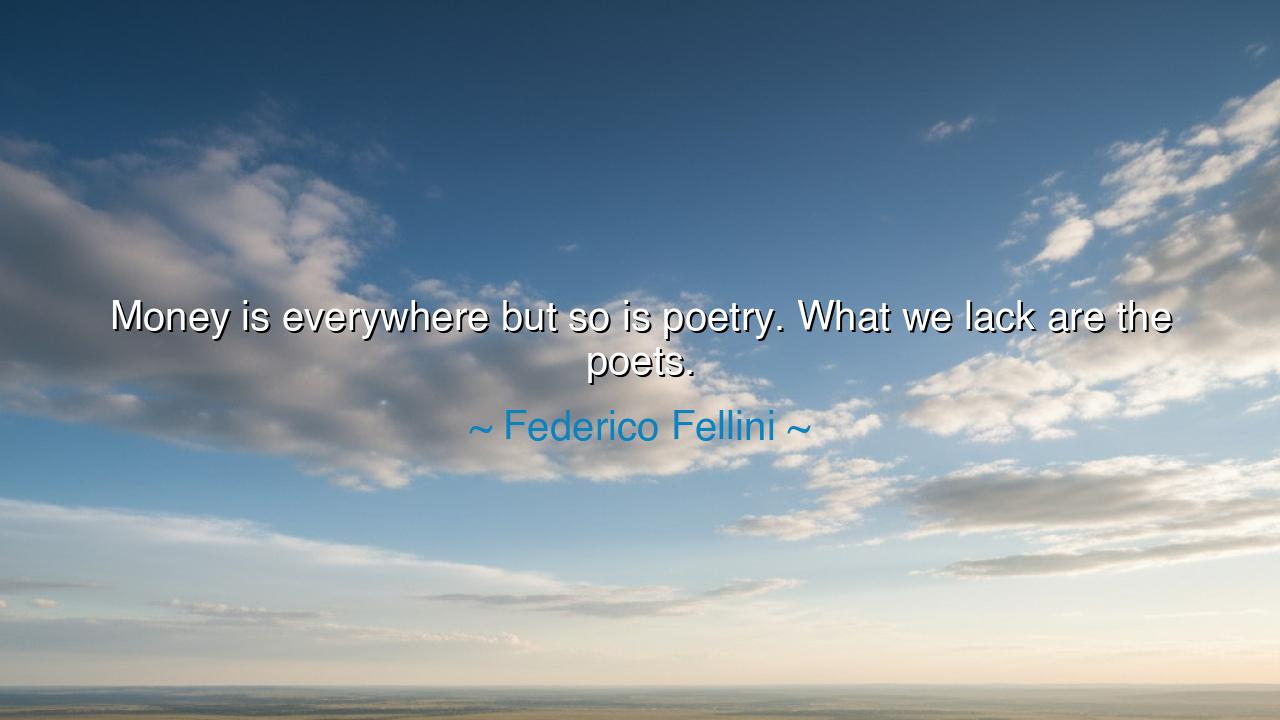
Money is everywhere but so is poetry. What we lack are the






Hear, O seekers of truth and beauty, the words of Federico Fellini, the dream-weaver of cinema: “Money is everywhere but so is poetry. What we lack are the poets.” In this saying lies a piercing lament and a radiant challenge. For he does not deny the presence of wealth in the world, nor the presence of beauty, wonder, and mystery; rather, he declares that our poverty is of spirit. Gold glitters in every corner, and poetry surrounds us like air and light—but there are too few eyes to see, too few hearts to sing, too few voices to give it form.
For what is money but a human invention, circulating in the veins of society, omnipresent in every marketplace, every deal, every ambition? It buys food, land, houses, and luxuries—but it cannot purchase the trembling of the heart before a sunset, the silent awe of starlight, the laughter of a child. These belong to poetry, which, like money, is everywhere—but unlike money, it is invisible unless one is willing to look. The world is not barren of poetry; it overflows with it. Yet, as Fellini warns, we suffer not from scarcity of poetry but from scarcity of poets.
Consider the streets of ancient Rome. Coins passed endlessly from hand to hand, paying soldiers, buying bread, feeding empires. But it was not the coins that endured through centuries—it was the verses of Virgil, the odes of Horace, the songs of the poets who revealed Rome’s soul. Empires crumble, but poetry remains, reminding us that what sustains humanity is not only wealth but vision. Money may be everywhere, but it is the poet who uncovers the eternal hidden in the dust of the ordinary.
Fellini himself was such a poet, though he clothed his poetry not in stanzas but in images upon the screen. In films like La Dolce Vita and 8½, he revealed that beneath the surface of consumerism, spectacle, and wealth, there lies a hunger for meaning. His art was a cry that modern life, overflowing with money, had forgotten to make space for wonder, for spirit, for poetry. His lament echoes still: where are the poets who will teach us to see the sacred in the midst of the profane?
History repeats this lesson. In the age of industrial expansion, factories multiplied and fortunes grew, but it was William Blake who stood as a prophet, seeing angels in the trees of London and decrying the “dark Satanic mills.” In the twentieth century, cities rose into towers of steel, but it was Langston Hughes and the voices of the Harlem Renaissance who revealed the music and sorrow in the lives of ordinary people. Always, the poets are needed, not because poetry is absent, but because the world forgets how to recognize it.
The lesson, then, is clear. To live only in pursuit of money is to live half-blind. To awaken to the presence of poetry in daily life is to live fully—but to be a poet is to make that poetry visible to others, to give it voice, to share it as bread for hungry souls. Not all are called to write verse, but all are called to become poets of living: to notice beauty, to honor mystery, to create meaning in a world that rushes past it.
Therefore, O children of tomorrow, do not be deceived into thinking poetry is rare or distant. It is in the wind that rattles the leaves, in the faces of strangers passing by, in the silence after laughter fades. Do not complain that life lacks poetry; complain instead if your heart has not been trained to see it. And if you would answer Fellini’s call, strive to be among the poets—those who, by their words, their art, their deeds, awaken others to the beauty that surrounds us. For money is everywhere, but it is poetry that makes life worth living. And without poets, the treasure of existence lies buried, unseen, unclaimed.
So remember Fellini’s wisdom: seek the poetry already woven into the fabric of the world, and dare to become one who reveals it. For to be a poet is not only to write—it is to live with eyes open, heart awake, and soul ablaze.






BBbe bap
This quote feels like a gentle reprimand. It implies that poetry isn’t dying because it’s scarce, but because we’ve stopped listening for it. Maybe we mistake poetry for something grand when it’s really found in simple acts—a smile, a sunset, a conversation. I’m curious whether Fellini meant ‘poets’ literally or metaphorically—perhaps he was calling for more people to live poetically, not just write poetically.
ATKim Anh Tran
There’s a sharp contrast here between money and poetry—between material wealth and emotional richness. Fellini seems to be saying that while both are abundant, society values only one. I can’t help but wonder how different the world would be if people sought poetry with the same intensity they pursue profit. Would we live more meaningfully, or would beauty lose its power if it became common currency?
NLNguyen Nhat Linh
I find this statement both hopeful and sad. It reminds me that beauty and meaning still exist everywhere, but few people take the time to notice or express them. Maybe Fellini isn’t just talking about poets who write, but about anyone capable of seeing the world with wonder. Do we all have the potential to be poets if we simply paid more attention?
NNam
This quote really resonates with me—it feels like a call to awareness. Fellini suggests that poetry isn’t confined to books or art; it’s hidden in daily life, waiting to be noticed. But the real issue is that people have stopped seeing it. I wonder if modern life, with its obsession with money and productivity, has dulled our ability to perceive beauty in ordinary things.